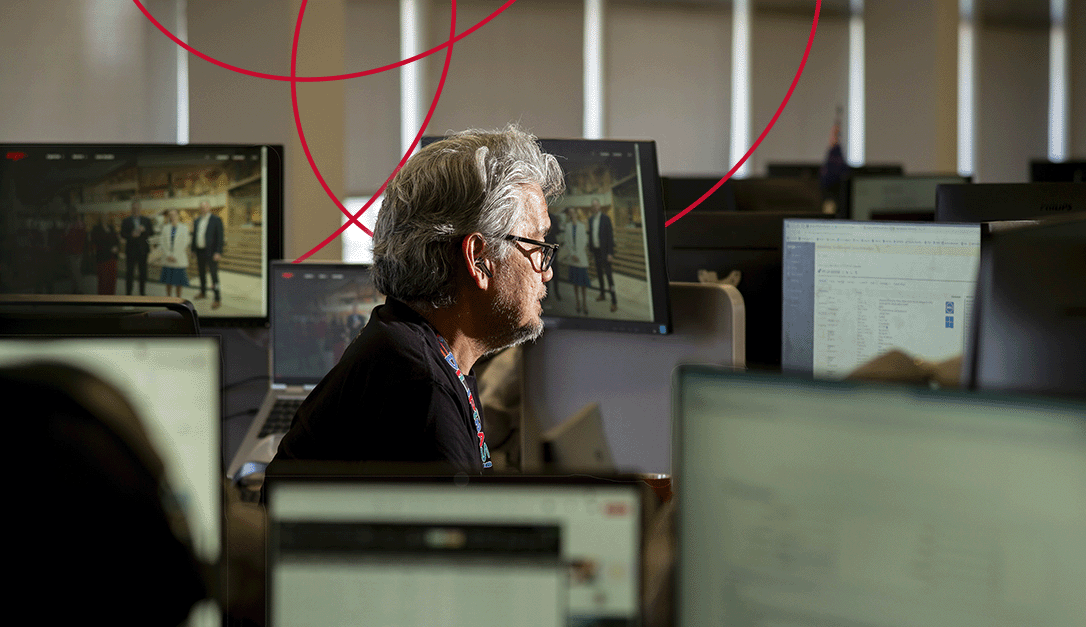Hybrid work strategies need technology adoption to be successful
Digital transformation was forced into action for many organisations because of the pandemic. Aftershocks from Covid lockdowns are still being felt by businesses with many employees choosing to walk rather than work in companies that don’t suit their lifestyle. 54% would consider leaving their job post-Covid if they are not afforded some form of flexibility in where and when they work.
For staff recruitment and retention reasons alone, it’s imperative that organisations not only embark on a hybrid work strategy but deliver it in a way that offers employees a seamless experience, underpinned by having the right technology in place, while upskilling your employees in using it. If people are not able to transition with ease between home and office; if they are not empowered with tools they know how to use, and if they are unable to communicate with colleagues as effortlessly as if they were in the same room, then your hybrid strategy will struggle to succeed.
Keeping company culture alive
Many enterprises fear that hybrid working will undermine a hard-earned company culture they have built up over many years. Here again, familiarity with a new wave of collaboration and communication tools will mitigate the risk. Products like the Microsoft 365 suite, particularly Teams, SharePoint and OneDrive are rich in features that make teamwork and collaboration seamless, regardless of where employees work.
No surprise that the Teams enablement service we launched during Covid proved so popular. Or how vendors have accelerated product development to meet the demand for hybrid working. Microsoft, for example, launched Viva at the start of 2021, an employee experience platform that brings tools for communication, wellbeing, learning and knowledge discovery into the everyday flow of work. It’s emblematic of a new people-centric approach to empowering the workforce.
The result of all the technological development is that remote working should no longer be considered an obstacle to company culture – quite the opposite because collaboration tools are a great enabler. 47% of technology leaders say their people are reclutant to embrace digitalisation and so the challenge is about bringing people along on the journey, helping them overcome resistance and making sure they know how to use the game-changing tools they are provided with.
Return on investment
Ergo set up an Adoption & Change Management Practice because we recognised that the technology we implement is only effective if it’s used. We came across clients that had rolled out Microsoft 365 and were paying for licenses without getting the most from the product. Worse, we saw companies paying for additional licences for products that offered no additional functionality beyond their M365 licences, they just didn’t know how to fully use the applications they had across their businesses.
The single biggest reason to encourage technology adoption through a carefully crafted change management programme is because it costs companies more money not to. But there are many other wins for the business, including increased productivity that comes from people making the most of the tools they are given to do their jobs. And unless people are using your technology to the fullest, the business is not going to get a return on the investment.
Many companies recognise they need tools like Teams to make hybrid possible but fail to realise that they are only paying only lip service to new ways of working if the tools are not embedded and adopted into the business. Hybrid working is a shift in culture and long-standing processes. Operating models need to reflect these changes to future proof an authentic hybrid approach, enabling one that engages and supports employees to do their best work.
Different levels of maturity
Adoption journeys have different starting points, depending on the organisation’s digital maturity. A change impact assessment will inform what actions are needed to deliver a smooth transition to hybrid working. At Ergo, we look at existing process and levels of digital engagement and use it to inform the phased delivery of our adoption programme.
It’s always a two-way conversation. Listening to employees and engaging with them as the principal stakeholders is paramount if a company is to become truly-people centric. Research shows how employees have strong ideas about work/life balance in a post-pandemic world, ideas that will vary and need to be factored into any hybrid plan.
Like every change programme, success depends on buy-in from the top layer of management, and it needs change champions to ensure new working practices are embraced across the organisation and that everyone is on the same page. At Ergo, we work closely with companies on stakeholder engagement and tailor communication programmes to the unique needs of each business.
Training for continual improvement
For large multinationals the challenge may be geographic. We have rolled out adoption programmes across different countries simultaneously as well as specific sites, aligned to the technology implementation to enable the introduction of a Modern Workplace and making sure the entire organisation can collaborate and communicate effectively. But it’s not just a one-off project. Adoption and training must be embedded in every business to support a process of continual improvement. A change management programme will implement not just the technology but a foundation to ensure the new ways of working evolve, whether it’s through champion networks, adoption metrics or up to date training portals that host educational content, which can ensure your business is set up for long term success. .
Our Change Management Practice works with each organisation to understand specific use cases. We are then able to provide thought leadership on what platform and tools are the best fit. We design a bespoke change management programme to ensure the new ways of working support better communication, collaboration as well as increased producitvity. For example, with Microsoft 365, we can highlight the key applications to focus business processes through. We implement a training and adoption programme to support employees to transition to the new ways of working. This way, we are able to define best practices that enhance collaboration across organisations, while improving security of the data in use.
At the end of the day, to truly realise a modern workplace, it’s about creating and embedding a hybrid culture that fits with the day-to-day workings of a company. Your employees need to have the tools and know how in place to support its realisation and it’s something that must be nurtured and managed.
Register now to join Ergo at the ‘Let’s Make Hybrid Work’ half-day event, where we discuss how to provide flexible working that’s great for employees and good for business. Begin your transition with us.






